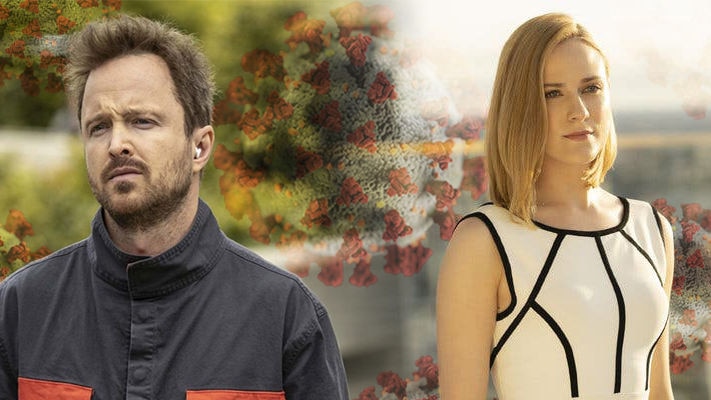Create a free profile to get unlimited access to exclusive videos, sweepstakes, and more!
Westworld Season 3 takes us to the real world... just as our world is changing

If the first episode is anything to go by, Westworld Season 3 could be the most relevant season of HBO's hit yet. Dolores has finally made it to the real world, and for the first time, audiences are getting a look at life outside of Delos' high-tech, deadly theme park. Unlike a simulation of the Wild West, an underground robot-construction facility, or a simulated A.I. world that's symbolic of the nature of life, the world that Dolores visits in the premiere actually seems familiar. Sure, it's set in 2058, but this world has problems that more closely echo some of our own world's most pressing issues.
Or they were the most-pressing issues until a couple of weeks ago. The spread of COVID-19 has, understandably, taken away a lot of attention from Westworld's premiere. In light of coronavirus, Westworld's attempts at social commentary seem far less relevant and urgent than they would otherwise, and that's unfortunate.
We're introduced to Westworld's real world on two fronts. First, we follow Dolores as she integrates herself into the lives of powerful, wealthy tech executives with ties to an extremely powerful and influential A.I. system. At the same time, we're also introduced to Caleb, played by Breaking Bad's Aaron Paul. Caleb, a veteran of some unknown future conflict, is decidedly not rich. He's working a low-level construction job alongside an automated co-worker, and he's desperately attempting to qualify for a better, presumably higher-paying job. The gig is in high demand, and Caleb just can't make the cut, for whatever reason. To make ends meet, he turns to the gig economy, which in Westworld's glossy dystopia is an app that allows you to sign up to do crime. Uber, but for theft.
There was a clear dichotomy in Westworld's first two seasons — there were the hosts, downtrodden and designed to serve (and die) for the pleasure of the show's other group, humans. The thing that was easy to forget, however, was that every single human in the first two seasons was incredibly wealthy. Some promotional material from HBO at the time revealed that trips to the park started at $40,000 per day, and more deluxe packages were far, far more expensive. There were no lower or middle-class guests at Westworld, and it's probably fair to assume that all the gainfully employed park workers were well-compensated, too. Even if the average Westworld viewer could afford a trip to Disney World now and then, it's probably fair to assume that they didn't have that much in common with the lives of Westworld's humans other than shared humanity. (And given all Westworld's twists, that's not a sure thing).
Caleb's life, though, might resemble yours much more. He's underemployed, is having trouble getting a better job, and he's turning to the gig economy to make ends meet. Granted, making deliveries for GrubHub isn't quite the same as crime-for-hire, but the patterns are there. Caleb is stuck in a rut created by the larger society and economic system he lives in. At the same time, people on the other end of the spectrum are drinking a glass of whiskey that costs three times more than their fathers ever made in their entire careers. It's not exactly a subtle way to convey gross economic inequality, but it's certainly effective.
Compared to the first two seasons' endlessly circular waxing about the nature of reality and life, watching Caleb struggle to find a place for himself in a world that outwardly presents itself as a glistening, perfect success is quite relatable. You even get the sense that Caleb's healthcare could be a little better.
But a Season 3 premiere feels a lot less important if you're watching it while quarantined. Westworld's mysteries don't mean anything compared to the all-consuming question of "what's going to happen?" That's fine — if you aren't more concerned about coronavirus than you are about Westworld, maybe do your elderly neighbors a favor and read up on the importance of social distancing.
Westworld Season 3 will continue to air new episodes every Sunday. It will be there for viewers as a much-needed source of entertainment and a brief respite from coronavirus news. And, even if it's maybe hard to appreciate them given a more urgent crisis, Westworld's thematic targets this season — the wealth gap and social inequality — are still incredibly relevant. Perhaps more than ever. Imagine what would happen if the criminal gig economy that Caleb relies on shut down due to a pandemic, then think about how much more dire his situation would be. COVID-19 is causing that exact scenario in the real world. So, even as coronavirus makes Westworld feel small in comparison, remember that it's still attempting, in its own way, to address something real and important for what feels like the first time.
The views and opinions expressed in this article are the author's, and do not necessarily reflect those of SYFY WIRE, SYFY, or NBCUniversal.


























